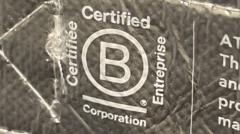Is the Global Environmental Award Just a Case of Greenwashing?

The Departure of Dr. Bronner's from B Corp: A Deep Dive into Sustainability Standards
In an era where sustainability and ethical business practices are increasingly at the forefront of consumer awareness, the recent decision by Dr. Bronner's to exit the B Corp certification scheme has sparked a significant conversation about the integrity and rigor of such certifications. This article explores the implications of this decision, the criticisms leveled against the B Corp framework, and what it means for the future of sustainability in business.
Understanding B Corp Certification
B Corp certification is a designation awarded by B Lab, a nonprofit organization, to companies that meet certain standards of social and environmental performance, accountability, and transparency. Since its inception in 2006, B Corp has grown to encompass over 9,600 companies across 102 countries and 161 industries. The objective of B Corp is to redefine success in business to include social and environmental performance alongside profit.
How B Corp Certification Works
To achieve B Corp certification, companies must complete a rigorous assessment known as the B Impact Assessment, which evaluates their impact on various stakeholders, including workers, customers, community, and the environment. Companies must score at least 80 points out of a possible 200 to qualify. The certification is renewable every three years, requiring firms to demonstrate improvement and adherence to evolving standards.
The Criticism of B Corp Standards
Despite its noble intentions, B Corp has faced criticism regarding the rigor of its standards. Critics argue that the certification allows companies with questionable practices to gain a veneer of legitimacy. Dr. Bronner's, a California-based soap manufacturer known for its commitment to ethical practices, has been vocal about its dissatisfaction with the B Corp framework. The company claims that it has become too accommodating to large multinationals, thereby diluting the meaning of what it means to be a "B Corp."
Dr. Bronner's Departure: A Message of Integrity
Dr. Bronner's decision to leave B Corp came as a surprise to many, considering its decade-long membership. In a statement, the company emphasized that it found it "unacceptable to be lumped in with large multinational consumer packaged goods with a history of serious ecological and labor issues." This statement echoes a growing sentiment among smaller, mission-driven companies that feel overshadowed by larger corporations that may not adhere to the same ethical standards.
Specific Incidents of Concern
One of the pivotal issues for Dr. Bronner's was the certification of Nespresso, owned by Nestlé, which the company believes has a troubling history regarding labor practices, including accusations of child labor within its supply chains. Dr. Bronner's argued that the B Corp certification allowed Nespresso to sidestep these serious allegations, thus contributing to "greenwashing" – a practice where companies present themselves as more environmentally friendly than they truly are.
The Evolution of B Corp Standards
In response to criticisms like those from Dr. Bronner's, B Lab has announced forthcoming changes to its certification process. Starting in 2026, the current point system will be replaced with minimum requirements across seven key areas: purpose and shareholder governance, fair work, justice, equity, diversity and inclusion, human rights, climate action, environmental stewardship, and government affairs and collective action. This shift aims to ensure that companies not only achieve a minimum score but also demonstrate real commitment to sustainable practices.
Why the Changes Matter
These adjustments could potentially address concerns about the adequacy of current certifications. The introduction of third-party verification is particularly noteworthy as it aims to enhance accountability and transparency within the B Corp community. Chris Turner, the CEO of B Lab UK, has indicated that the new standards will not target multinationals specifically but will raise expectations for all businesses, acknowledging that larger companies have a greater potential for impact.
The Future of Sustainability Certification
Dr. Bronner's exit raises questions about the future of sustainability certifications and their role in fostering genuine ethical practices in business. Smaller companies like Dr. Bronner's often feel that they are held to higher standards than larger corporations, which can afford to pay for certifications without necessarily changing their practices. This disparity can lead to a credibility gap that undermines the very purpose of such certifications.
Alternative Approaches to Certification
In light of its departure from B Corp, Dr. Bronner's has established its own initiative called the "Purpose Pledge." This program is designed to hold companies accountable to higher ethical standards and ensure that they are genuinely committed to sustainability. The Purpose Pledge emphasizes fair wages, supply chain integrity, and community accountability. So far, 14 companies have signed up, reflecting a shared desire for a more rigorous and transparent approach to sustainability.
What Lies Ahead for B Corp and Sustainability
As the landscape of corporate sustainability continues to evolve, the conversation around certifications like B Corp will likely intensify. Companies and consumers alike are increasingly scrutinizing the credentials of brands they support. For businesses, the challenge lies in genuinely integrating sustainable practices rather than merely seeking certification as a marketing tool.
Implications for Small Businesses
Smaller businesses, which often have fewer resources than their larger counterparts, may find the evolving B Corp standards to be a double-edged sword. On one hand, more rigorous standards can enhance credibility and consumer trust. On the other hand, the increased expectations may pose challenges for smaller firms that lack the infrastructure or financial stability to meet new requirements.
Conclusion
The departure of Dr. Bronner's from the B Corp certification scheme highlights the complexities and challenges surrounding corporate sustainability and ethical business practices. As consumers increasingly demand transparency and accountability from the brands they support, it is essential for companies to adopt genuine sustainable practices rather than rely on certifications as a marketing strategy.
As the B Corp framework evolves, it remains to be seen whether it will successfully address the concerns raised by companies like Dr. Bronner's and whether other businesses will follow suit in exploring alternative certification pathways. The future of sustainable business practices hinges on companies' willingness to embrace transparency and hold themselves accountable, ensuring that their actions align with their mission.
What do you think the future holds for sustainability certifications? Will businesses prioritize genuine ethical practices over mere certification? #Sustainability #EthicalBusiness #BCorp
FAQs
What is B Corp certification?
B Corp certification is a designation for companies that meet high standards of social and environmental performance, accountability, and transparency, awarded by the nonprofit organization B Lab.
Why did Dr. Bronner's leave B Corp?
Dr. Bronner's left B Corp due to concerns that the certification was not strict enough and allowed large multinationals with questionable practices to gain certification, thereby diluting the meaning of being a B Corp.
What are the new B Corp standards coming in 2026?
Starting in 2026, B Corp certification will no longer use a point system but will require companies to meet minimum standards in seven key areas, including environmental stewardship, fair work, and human rights.
What is the Purpose Pledge?
The Purpose Pledge is an initiative created by Dr. Bronner's to promote higher ethical standards and accountability among companies committed to sustainability.
How does B Corp certification benefit companies?
B Corp certification can help companies attract more environmentally and socially conscious customers, enhance brand credibility, and improve employee engagement and loyalty.
Published: 2025-06-29 23:09:11 | Category: technology



